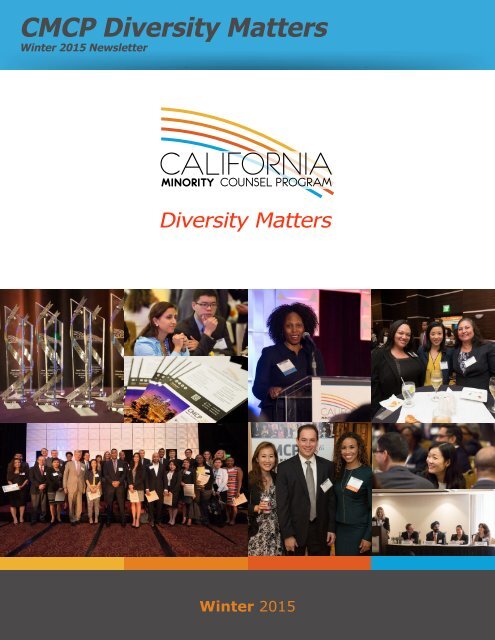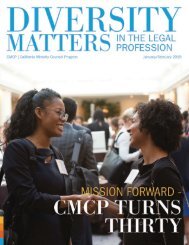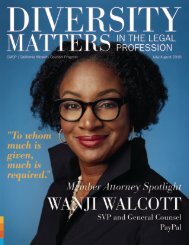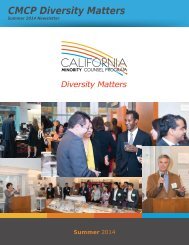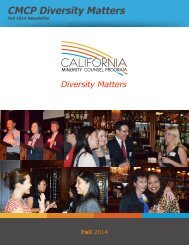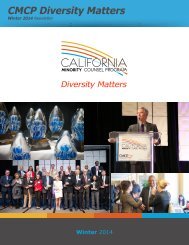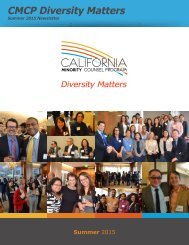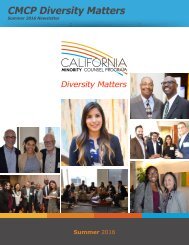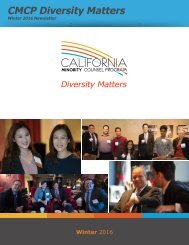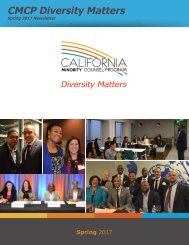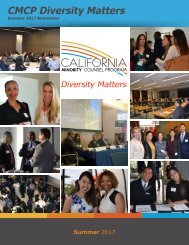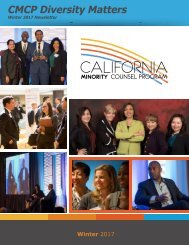Winter 2015
California Minority Counsel Program Diversity Matters eNewsletter Winter 2015 Issue
California Minority Counsel Program Diversity Matters eNewsletter Winter 2015 Issue
Create successful ePaper yourself
Turn your PDF publications into a flip-book with our unique Google optimized e-Paper software.
CMCP Diversity Matters<br />
<strong>Winter</strong> <strong>2015</strong> Newsletter<br />
MINORITY<br />
<strong>Winter</strong> <strong>2015</strong><br />
1
CMCP Diversity Matters<br />
<strong>2015</strong> eNewsletter Committee Members<br />
Tambry L. Bradford<br />
(Co-Chair)<br />
Special Counsel<br />
Pepper Hamilton LLP<br />
Cassandra Mougin<br />
(Co-Chair)<br />
Shareholder<br />
Pettit Kohn Ingrassia & Lutz, PC<br />
Michael Chung<br />
Of Counsel<br />
Willenken Wilson Loh &<br />
Delgado LLP<br />
Karen A. Henry<br />
Counsel<br />
Davis Wright Tremaine LLP<br />
Noah Perez-Silverman<br />
Associate<br />
Caldwell Leslie & Proctor, PC<br />
Kelly Perigoe<br />
Associate<br />
Caldwell Leslie & Proctor, PC<br />
David Shimkin<br />
Member<br />
Cozen O’Connor<br />
Jonathan Turner<br />
Partner<br />
Mitchell Silberberg & Knupp LLP<br />
1
<strong>Winter</strong> <strong>2015</strong> Newsletter<br />
Table of Contents<br />
page 3<br />
Attorney Spotlight Series:<br />
CMCP Executive Director, Robert White<br />
page 4<br />
Employer Alert re California Fair Pay Act<br />
page 6<br />
CMCP 26th Annual Business<br />
Conference Highlights<br />
page 11<br />
page 14<br />
page 15<br />
page 17<br />
Meet Your New CMCP Board Members –<br />
Attorney Spotlight Series:<br />
Sharon Tomkins, Vice President & General Counsel,<br />
Southern California Gas Company<br />
California Supreme Court Raises the Bar for<br />
Recovery of Costs by Prevailing Defendants in<br />
FEHA Cases<br />
Business Development Series:<br />
When it Comes to Business Development,<br />
Everyone is a Solo<br />
AB1141 Amends California Code of Civil<br />
Procedure<br />
page 18<br />
The Revised Federal Rules of Civil Procedure:<br />
Proportionality is King<br />
page 20<br />
Diversity Calendar<br />
Mark Your Calendars for Upcoming Diversity Events<br />
2
CMCP Diversity Matters<br />
ATTORNEY<br />
SPOTLIGHT ON<br />
CMCP Executive Director, Robert White<br />
By: Karen A. Henry, Counsel, Davis Wright Tremaine LLP<br />
Karen Henry, Counsel in Davis Wright Tremaine's media practice sits down with new<br />
Executive Director Robert White of the California Minority Counsel Program in this interview.<br />
This video will open in a new webpage.<br />
Karen Henry is Counsel at Davis Wright Tremaine’s Los<br />
Angeles office. Litigating in state and federal court,<br />
Karen maintains a broad and diverse practice, focusing<br />
primarily on media, IP, and entertainment law. In her<br />
practice, she defends clients in a range of matters,<br />
including copyright, trademark, right-of-publicity, theft of<br />
ideas, defamation, and invasion of privacy litigation.<br />
For more info about Karen, click here.<br />
3
<strong>Winter</strong> <strong>2015</strong> Newsletter<br />
Employer Alert re California Fair Pay Act<br />
By: Jonathan M. Turner, Partner, Mitchell Silberberg & Knupp LLP<br />
If they have not already done so, California<br />
employers must take steps to see that their pay<br />
practices conform to the new standards established<br />
under the California Fair Pay Act (“CFPA”), which<br />
becomes effective on January 1, 2016. The CFPA<br />
amends section 1197.5 of the California Labor Code,<br />
which prohibits employers from paying employees at<br />
wage rates “less than employees of the opposite sex<br />
in the same establishment for equal work on jobs the<br />
performance of which requires equal skill, effort, and<br />
responsibility, and which are performed under similar<br />
working conditions.” Since the enactment of Section<br />
1197.5 in 1949, employees who could establish the<br />
existence of a gender-based pay differential “for the<br />
same work in the same establishment” could sue to<br />
recover for the amount of the pay differential; however,<br />
according to the legislative findings giving rise to<br />
the enactment of the CFPA, Section 1197.5 has been<br />
“rarely utilized because the current statutory language<br />
makes it difficult to establish a successful claim.”1 The<br />
legislature also found that “pay secrecy” contributes<br />
to gender-based wage disparities “because women<br />
cannot challenge wage discrimination that they do<br />
not know exists.”2 Hence, in passing the CFPA, the<br />
state legislature declared its intent to make it easier for<br />
employees to sue and recover under the statute.<br />
What follows is a summary of the CFPA and how its<br />
enactment amends existing law under section 1197.5.<br />
Expansion of the statutory mandate that employers<br />
must pay employees equal pay for equal work<br />
Under the current statute, employees are able to<br />
recover on gender-based wage disparity claims for<br />
jobs that require “equal skill, effort and responsibility,<br />
and which are performed under similar working<br />
conditions,” when compared to jobs performed<br />
by employees of the opposite sex at the same<br />
establishment. The CFPA expands the scope of wage<br />
disparity claims that can be pursued, both in terms of<br />
the similarity of jobs that are being compared, and the<br />
location where those jobs are being performed.<br />
1.<br />
SB 358, Section 1(c).<br />
2.<br />
SB 358, Section 1(d).<br />
Continued on next page…<br />
4
5<br />
CMCP Diversity Matters<br />
Under the CFPA, equal pay is required for “substantially<br />
similar work, when viewed as a composite of skill,<br />
effort and responsibility, and performed under similar<br />
working conditions.” Additionally, the CFPA removes<br />
the “same establishment” requirement when making<br />
the comparison; hence, employees will be able to<br />
pursue equal pay claims based on evidence that<br />
employees of the opposite gender working at another<br />
facility are being paid more.<br />
Defenses to claims for gender-based wage<br />
differentials<br />
Under the current law, an employer can defend against<br />
gender-based claims of wage disparity by proving that<br />
any such disparity is based on one of the following<br />
criteria: (1) a seniority system, (2) a merit system, (3) a<br />
system which measures earnings by quantity or quality<br />
of production, or (4) a differential based on any bona<br />
fide factor other than sex. While the CFPA does not<br />
abolish these defenses, it has made it more difficult<br />
for employers to prevail on them. The CFPA clarifies<br />
that the employer has the burden to demonstrate that<br />
one or more of these criteria accounts for the disparity.<br />
With respect to the fourth criteria, the employer must<br />
demonstrate that: (1) the factor other than sex is not<br />
based on or derived from a sex-based differential<br />
in compensation; (2) the factor is job-related with<br />
respect to the position in question; and (3) the factor is<br />
consistent with a “business necessity.”<br />
In order to demonstrate “business necessity,” the<br />
employer now must prove that the wage disparity<br />
achieves “an overriding legitimate business purpose<br />
such that the factor relied upon effectively fulfills the<br />
business purpose it is supposed to serve.” Further, the<br />
defense will not apply “if the employee demonstrates<br />
that an alternative business practice exists that would<br />
serve the same business purpose without producing<br />
the wage differential.”<br />
Employer record keeping requirements expanded<br />
from two to three years<br />
Under the current statute, employers are required to<br />
maintain files containing pay records of the wages and<br />
wage rates, job classifications, and other terms and<br />
conditions of employment of its employees for two<br />
years. The CFPA expands this time frame to three years.<br />
Protections for employees who discuss or request<br />
wage information<br />
The CFPA includes a provision outlawing any employer<br />
policy that prohibits an employee from “disclosing<br />
the employee’s own wages, discussing the wages of<br />
others, inquiring about another employee’s wages, or<br />
aiding or encouraging any other employee to exercise<br />
his or her rights under this section.” Although the<br />
CFPA prohibits employers from retaliating against<br />
employees who request that their employer provide<br />
them with wage information regarding co-workers,<br />
the CFPA does not obligate the employer to provide<br />
employees with this information.<br />
Remedies for wage disparity violations under CFPA<br />
The CFPA makes no change to what employees can<br />
recover for gender-based wage disparity claims.<br />
Employees who prevail on such claims are entitled to<br />
the amount of the wage differential that was withheld,<br />
plus an equal amount as liquidated damages, and<br />
prejudgment interest. The recovery period is two<br />
years from the filing of an action, except that an action<br />
arising out a willful violation extends the recovery<br />
period to three years.<br />
Attorney’s fees are also recoverable by plaintiffs who<br />
prevail on claims under the CFPA.<br />
For an analysis of the predicted effect of the CFPA<br />
on legislation, check out the next issue of the<br />
CMCP Newsletter.<br />
Jonathan Turner is a partner in the Los Angeles office of<br />
Mitchell Silberberg & Knupp LLP. A significant portion of<br />
his practice is in the motion picture industry, where he<br />
has represented studios and other employers in labor<br />
arbitrations, administrative proceedings, court litigation,<br />
union avoidance issues, and collective bargaining<br />
negotiations. For more info about Jonathan, click here.
<strong>Winter</strong> <strong>2015</strong> Newsletter<br />
CMCP 26th Annual<br />
Business Conference<br />
Highlights<br />
Watch the keynote address by<br />
Karen Roberts, Executive Vice<br />
President and General Counsel,<br />
Wal-Mart Stores, Inc.<br />
Click below to launch the video.<br />
6
7<br />
CMCP Diversity Matters
<strong>Winter</strong> <strong>2015</strong> Newsletter<br />
8
MEET YOUR NEW CMCP BOARD MEMBERS<br />
CMCP Diversity Matters<br />
ATTORNEY<br />
SPOTLIGHT ON<br />
SHARON TOMKINS – Vice President and General Counsel,<br />
Southern California Gas Company<br />
By: Noah Pérez-Silverman, Associate, Caldwell Leslie & Proctor, PC<br />
Sharon Tomkins, Vice<br />
President and General<br />
Counsel of Southern<br />
California Gas (“SoCalGas”),<br />
loves engaging with cutting edge<br />
issues. Indeed, she decided to<br />
focus her career on energy and<br />
regulatory work in large part<br />
because the energy sector is so<br />
dynamic: the rules and guidelines<br />
for greenhouse gas emissions are<br />
constantly changing, with both<br />
legislators and the public showing<br />
increasing interest in energy<br />
efficiency. In this energy climate,<br />
Sharon loves being in a position to<br />
make sure that SoCalGas (and its<br />
parent, Sempra Energy) is making<br />
smart choices to move the energy<br />
sector forward in a thoughtful<br />
way. Her desire to tackle cutting<br />
edge issues also led her to join the<br />
Board of the California Minority<br />
Counsel Program (“CMCP”) during<br />
a time of transition. With Executive<br />
Director Emeritus Marci Rubin<br />
handing the reins to incoming<br />
Executive Director Robert White,<br />
Sharon is excited to help the<br />
organization handle the transition<br />
smoothly and continue to be as<br />
effective and engaging as it was<br />
under Marci’s stewardship.<br />
A brief look back at Sharon’s<br />
impressive career might give<br />
the impression that Sharon has<br />
always had a laser-like focus on<br />
energy work. She started doing<br />
regulatory energy work shortly<br />
after beginning her legal career at<br />
O’Melveny & Myers LLP. When she<br />
became a partner at O’Melveny,<br />
she focused her practice on the<br />
energy sector. She founded the<br />
firm’s Energy, Natural Resources<br />
& Environmental Practice. She<br />
taught a course on Energy Law,<br />
Policy and Climate Change at<br />
UCLA Law School. And she has<br />
published several articles on<br />
legal challenges facing the energy<br />
sector.<br />
In truth, however, Sharon’s path<br />
was anything but predetermined,<br />
and she acknowledges that her<br />
career has been shaped not<br />
only by her own drive but also<br />
by a number of mentors who<br />
guided her into the profession<br />
and field she now occupies. After<br />
growing up in northern Idaho and<br />
11
<strong>Winter</strong> <strong>2015</strong> Newsletter<br />
graduating from Pennsylvania<br />
State University with a degree<br />
in English, Sharon initially<br />
considered pursuing a Ph.D.<br />
in the same discipline. But her<br />
sister-in-law, a lawyer at Gibson,<br />
Dunn & Crutcher LLP, convinced<br />
her she would enjoy being a<br />
lawyer. Sharon took this advice,<br />
thrived at USC Law School, and<br />
at the encouragement of her civil<br />
procedure professor, applied for<br />
and secured a clerkship with the<br />
Honorable Danny J. Boggs on the<br />
Sixth Circuit Court of Appeals.<br />
After clerking, Sharon joined<br />
O’Melveny’s Los Angeles office.<br />
During the California energy<br />
crisis at the beginning of the<br />
millennium, Sharon was assigned<br />
to work on an energy matter.<br />
Although she had not taken<br />
energy courses in law school—<br />
indeed, most law schools did not<br />
offer energy courses at the time—<br />
she dived in and immersed herself<br />
in the world of regulatory energy<br />
work. She speaks with great<br />
admiration of several mentors she<br />
had at O’Melveny. John Daum,<br />
in particular, stands out. While<br />
walking to the courthouse for<br />
hearings in a case they worked on<br />
together, John would tell Sharon<br />
his strategy for the hearing, and on<br />
the walk back, he would unpack<br />
why he may have changed his<br />
strategy mid-stream. Sharon found<br />
John’s willingness to explain his<br />
strategic thinking invaluable.<br />
By the time Sharon made partner,<br />
she had a wealth of experience<br />
in both energy regulatory work<br />
and securities fraud litigation, but<br />
she decided to focus on energy<br />
work, in large part because of<br />
the exciting challenges of the<br />
constantly changing energy<br />
landscape. Sharon took a six<br />
month secondment to SoCalGas,<br />
and when an opportunity arose<br />
to move in-house at Sempra<br />
several years later, Sharon took it.<br />
In September 2014, Sharon was<br />
elevated to General Counsel of<br />
SoCalGas.<br />
As General Counsel, Sharon<br />
oversees a legal department that<br />
comprises 23 lawyers who are<br />
divided into four main practice<br />
areas: regulatory, litigation,<br />
commercial, and environmental.<br />
Although she practices law less<br />
than she did before becoming<br />
GC, she enjoys spending more<br />
time thinking strategically about<br />
the business side of SoCalGas:<br />
how to grow the company while<br />
also dealing with regulatory<br />
rulemaking, ratemaking<br />
procedures from the California<br />
Public Utilities Commission,<br />
and new legislation. When new<br />
legislation or agency procedures<br />
are proposed or passed, Sharon<br />
strategizes about how SoCalGas<br />
fits into the picture. With the<br />
development of more forms of<br />
renewable energy, smart meters,<br />
electrical vehicles and more,<br />
there has never been a more<br />
exciting time to be part of the<br />
energy sector. Key challenges<br />
Sharon identifies include making<br />
sure the overall energy grid<br />
remains reliable despite the<br />
introduction of renewables into<br />
the energy portfolio, and thinking<br />
about how natural gas fits into<br />
that portfolio as a base fuel to help<br />
support renewables.<br />
Having benefitted from strong<br />
mentorship during her career,<br />
Sharon prioritizes mentoring<br />
junior attorneys. Sharon makes<br />
a point of getting to know the<br />
attorneys she supervises and<br />
providing them substantive<br />
feedback. Her first piece of<br />
advice, perhaps unsurprisingly,<br />
is to develop one’s skills as a<br />
lawyer, because at the end of<br />
the day the quality of the work<br />
is paramount. But she is also<br />
quick to acknowledge that the<br />
value of networking cannot<br />
be underestimated. With this<br />
understanding and her focus<br />
on mentorship, it should be no<br />
surprise that Sharon jumped at<br />
the opportunity to join CMCP’s<br />
Board. She was introduced to<br />
the organization by Dave Smith,<br />
former General Counsel of both<br />
SoCalGas and San Diego Gas &<br />
Electric, who still serves on the<br />
Board. Since his time on the<br />
Board as GC of SoCalGas/SDGE<br />
was coming to an end due to his<br />
retirement from the company, he<br />
suggested Sharon get involved.<br />
At the time, Sharon was not very<br />
familiar with CMCP; but after<br />
attending the annual conference<br />
and meeting former Executive<br />
Director Marci Rubin, Sharon knew<br />
it was an organization she could<br />
get passionate about.<br />
Continued on next page…<br />
12
CMCP Diversity Matters<br />
Sharon cares deeply about<br />
diversity in the legal profession,<br />
and she is acutely aware of the<br />
challenges facing both women and<br />
minority lawyers. She applauds<br />
CMCP’s focus on providing valuable<br />
networking opportunities to<br />
lawyers who are underrepresented<br />
in the legal profession, particularly<br />
at the partnership and executive<br />
levels. Sharon admires how CMCP<br />
manages to be relevant to both<br />
firm lawyers and in-house lawyers,<br />
and in her leadership role, she<br />
hopes to help CMCP continue that<br />
dual focus.<br />
Sharon ardently hopes the legal<br />
profession eventually reaches<br />
a point where its membership<br />
reflects the larger society. And<br />
as the profession diversifies, she<br />
hopes lawyers do not lose sight of<br />
their individuality. Her final piece<br />
of advice for junior lawyers is to be<br />
authentic to themselves: “If you do<br />
not feel comfortable being yourself<br />
at your current job, it probably is<br />
not the right place for you.” In fact,<br />
she offers the same advice—with<br />
perhaps even more emphasis—to<br />
attorneys in senior positions, who<br />
might cast a larger shadow: “When<br />
bosses are authentic, it shows junior<br />
attorneys they can succeed by being<br />
their genuine selves, as well.”<br />
As for the authentic Sharon<br />
Tomkins? She is an avid cyclist<br />
who also enjoys running and<br />
lifting weights. She loves spending<br />
time with her husband and four<br />
children. And she is a literature<br />
enthusiast, as well. She is currently<br />
reading The Jaguar’s Children,<br />
John Vaillant’s first piece of<br />
fiction, about immigrants who<br />
use coyotes to come to the United<br />
States and get trapped mid-route.<br />
Her love of literature also led<br />
her to serve on the Board of the<br />
Library Foundation of Los Angeles,<br />
which supports the educational<br />
programming of the LA Library,<br />
including tutoring and other<br />
services. She also serves on the<br />
Board of the Constitutional Rights<br />
Foundation, which is focused<br />
on educating youth about civic<br />
engagement and democracy.<br />
As these activities demonstrate,<br />
Sharon is dedicated to helping<br />
support the next generation, a<br />
dedication that she will certainly<br />
use to enrich CMCP.<br />
Noah Pérez-Silverman is an Associate at Caldwell Leslie’s Los Angeles office.<br />
Noah has an impressive breadth of experience. He has handled complex<br />
privilege issues, supervised voluminous electronic discovery projects, and helped<br />
obtain terminating sanctions against an adversary for litigation misconduct. For<br />
more info about Noah, click here.<br />
13
<strong>Winter</strong> <strong>2015</strong> Newsletter<br />
California Supreme Court Raises the<br />
Bar for Recovery of Costs by Prevailing<br />
Defendants in FEHA Cases<br />
By: Jennifer N. Lutz, Shareholder, Pettit Kohn Ingrassia & Lutz PC<br />
In Williams v. Chino Valley Independent Fire District,<br />
the California Supreme Court held that a prevailing<br />
defendant in a California Fair Employment and<br />
Housing Act (“FEHA”) case can only recover costs<br />
of suit where the plaintiff’s action was objectively<br />
groundless.<br />
Loring Williams (“Williams”) worked as a firefighter<br />
for Chino Valley Independent Fire District (“Chino<br />
Valley”). Williams sued Chino Valley, alleging disability<br />
discrimination in violation of the FEHA. The trial court<br />
granted summary judgment in Chino Valley’s favor<br />
and awarded it costs totaling $5,368.88. The court of<br />
appeal affirmed, holding that the prevailing party was<br />
entitled to court costs as a matter of right pursuant<br />
to Code of Civil Procedure section 1032(b) (“Section<br />
1032(b)”). A defendant/employer, however, may only<br />
be awarded attorneys’ fees if the plaintiff’s suit was<br />
baseless and unfounded.<br />
On appeal, the California Supreme Court held that<br />
a defendant prevailing in a FEHA action is entitled<br />
to recover its ordinary costs only in the discretion<br />
of the trial court. Section 1032(b) guarantees that<br />
prevailing defendants are “entitled as a matter of<br />
right” to recover the costs expended in litigation “[e]<br />
xcept as otherwise expressly provided by statute.”<br />
The California Supreme Court reasoned that Section<br />
12965(b) of the Government Code expressly excepts<br />
parties in a FEHA action from this entitlement.<br />
FEHA explicitly states that costs are awarded in the<br />
discretion of the trial judge: “[i]n civil actions brought<br />
under this section, the court, in its discretion, may<br />
award to the prevailing party, reasonable attorneys’<br />
fees and costs.” Thus, the trial court has discretion in<br />
deciding whether to award ordinary court costs to a<br />
prevailing defendant in a FEHA action.<br />
In holding that a prevailing defendant should only<br />
recover its costs and attorneys’ fees if the plaintiff’s<br />
action was objectively groundless, the California<br />
Supreme Court opined that plaintiffs should not be<br />
forced to bear such a high risk in order to “vindicate<br />
their statutory right against workplace discrimination.”<br />
Because even ordinary litigation fees can be substantial,<br />
the possibility of their assessment could significantly<br />
chill the vindication of employees’ civil rights.<br />
Pursuant to this ruling, a prevailing plaintiff will<br />
generally be able to recover his or her costs and<br />
attorneys’ fees while a prevailing defendant likely will<br />
not be awarded costs or attorneys’ fees unless the court<br />
determines that the plaintiff’s claims were frivolous.<br />
Jennifer N. Lutz focuses her practice in employment<br />
litigation and counseling. Jennifer represents California’s<br />
employers in all aspects of employment disputes in<br />
state and federal court, and before administrative and<br />
government agencies. For more info on Jennifer, click here.<br />
14
CMCP Diversity Matters<br />
Business Development Series:<br />
When it Comes to Business Development,<br />
Everyone is a Solo<br />
By: Martha Sullivan, Principal, Thornton Marketing<br />
My coaching clients often ask if there is a difference between marketing plans for solo<br />
practitioners and those created by lawyers who work in large firms. Ultimately, your<br />
marketing plan is based on your individual goals. Your plan may include tasks related to your<br />
practice group, or the geographic location of your office, but when you’re out in the world,<br />
you are selling your own relationship to potential clients and referral sources. There can be<br />
an advantage to being part of a firm or a practice group that can complement your expertise.<br />
Obviously, there are many clients who need full-service firms, but there are just as many<br />
clients who need only one specific set of skills at certain times.<br />
15
<strong>Winter</strong> <strong>2015</strong> Newsletter<br />
Assuming that you have a written marketing plan (and of course, you have one), here<br />
are four suggestions for fine-tuning your business development efforts.<br />
1<br />
Differentiate<br />
2<br />
3<br />
4<br />
Your Practice<br />
For most lawyers, it is daunting to figure out a way to stand out in a large firm, particularly as<br />
an associate. Aurelio Perez, an associate at Littler, understood early on that he was competing<br />
for attention with more than 1,000 other employment lawyers within his firm. On the business<br />
development panel at the CMCP Annual Conference in October, he talked about building his<br />
practice. He found a way to market one unique skill and create an identity for himself: he has<br />
become “the guy who knows about the garnishment of wages in employment cases.” As he likes<br />
to say, “There are riches in niches.” He has found a way to differentiate himself in a memorable<br />
way. Even though he represents a large firm, he is, in essence, a solo practitioner. Unlike true<br />
solos, his potential clients include hundreds of internal colleagues in offices all over the country.<br />
Implement Your Marketing Plan<br />
If you are one of those lawyers who are reluctant to create their own marketing plan, you may be<br />
assuming that “someone else” in your firm will magically find clients and create work for you. If<br />
you start to plan like a solo, and know that you are fully responsible for revenue goals, you will<br />
behave differently. You will attend the networking events that you might have avoided in the past.<br />
You are more likely to join an association and volunteer for a committee, instead of letting one of<br />
your colleagues reap the benefits. To become more visible, you might even speak at an industry<br />
event. And you’ll continue to implement your marketing plan, even when the siren song of billable<br />
hours calls you.<br />
Make Client Retention a Priority<br />
Solo practitioners tend to focus on client retention. They have a clear understanding of the direct<br />
relationship between satisfied clients and a steady revenue stream. They know how difficult it can<br />
be to acquire new clients and how much effort it takes to replace a client. They don’t have the<br />
luxury of ignoring client service issues, from communication styles to invoicing formats to overall<br />
responsiveness. Even if you are sure that you handle these issues well, it is worth the effort to<br />
ask your clients for their evaluation. If you have seen the studies that compare in-house counsel<br />
opinions about client service and their outside counsel self-evaluations, you know that there is a<br />
significant gap in the scores, and not in a positive way.<br />
Own the Relationship<br />
For a solo practitioner, there is no question about who “owns” the client. Obviously, that is a more<br />
difficult issue in large firms, particularly when originations determine compensation. Setting aside<br />
the political issues about originations for the moment, if you market like a solo and provide client<br />
service like a solo, you increase the possibility of owning and managing the long-term relationship<br />
with your client.<br />
Martha Sullivan is a business development coach for<br />
attorneys and other professional service providers.<br />
She is certified as a professional coach and has more<br />
than 25 years of experience in marketing and business<br />
development. For more info about Martha, click here.<br />
16
CMCP Diversity Matters<br />
AB1141 Amends<br />
California Code of<br />
Civil Procedure<br />
By: Jennifer N. Lutz, Shareholder,<br />
Pettit Kohn Ingrassia & Lutz PC<br />
AB 1141, which was passed on September 28,<br />
<strong>2015</strong> and made effective January 1, 2016,<br />
revives an expired procedure for filing a motion<br />
for summary adjudication to facilitate resolution of a<br />
case. A change in the law in 2011 previously amended<br />
Section 473c of the Code of Civil Procedure. Under<br />
that change, courts were allowed, from January 1,<br />
2012 until December 31, 2014, to summarily adjudicate<br />
portions of major causes of action or affirmative<br />
defenses, without resolving the entire cause of action<br />
or affirmative defense in the case. This change in<br />
the law required that both parties stipulate that the<br />
resolution of the issue by the court would either: (1)<br />
reduce the time of trial; or (2) significantly increase the<br />
ability of the parties to resolve the case by settlement.<br />
According to an article in the California Bar Journal, To<br />
Summarily Adjudicate or Not Adjudicate: The Recent<br />
Amendments to Section 437c, the amended statute<br />
provided necessary and long-awaited benefits to both<br />
defense and plaintiff attorneys. ( www.calbarjournal.<br />
com/march2012 ). However, the amended statute,<br />
which was codified under subsection (s) of Section<br />
437c, expired on January 1, <strong>2015</strong>. AB 1141 reenacts<br />
this summary adjudication provision, allowing courts<br />
to grant motions to resolve certain issues within a<br />
cause of action, thereby improving judicial economy,<br />
reducing the duration of trials, and encouraging pretrial<br />
settlements.<br />
Under the new amendment, before filing a motion<br />
for summary adjudication, the moving party must file<br />
with the court: (1) a joint stipulation stating the issue<br />
or issues to be adjudicated and (2) a declaration from<br />
each stipulating party that the motion will further the<br />
interest of judicial economy by decreasing trial time<br />
or significantly increasing the likelihood of settlement.<br />
The moving party must then serve the joint stipulation<br />
on any party to the action who is not also a party to<br />
the motion. CCP 437c(s).<br />
Within 15 days of receipt of the stipulation and<br />
declarations, the court will notify the stipulating<br />
parties as to whether the motion may be filed. If the<br />
court elects not to allow the filing of the motion, the<br />
stipulating parties may request, and upon request<br />
the court will conduct, an informal conference with<br />
the stipulating parties to permit further evaluation<br />
of the proposed stipulation. If the motion is<br />
allowed, the motion must contain a statement in<br />
the notice of motion that reads substantially similar<br />
to the following: “This motion is made pursuant to<br />
subdivision (s) of section 437c of the Code of Civil<br />
Procedure. The parties to this motion stipulate that<br />
the court shall hear this motion and that the resolution<br />
of this motion will further the interest of judicial<br />
economy by decreasing trial time or significantly<br />
increasing the likelihood of settlement.”<br />
In addition to amending the code section governing<br />
summary adjudication, AB 1141 also amends Code of<br />
Civil Procedure section 998 to equalize the treatment<br />
of expert witness costs that are awarded to a<br />
defendant and plaintiff after the other side’s rejection<br />
of the settlement offer so that a court can order a<br />
defendant, like a plaintiff, to pay the other side’s costs<br />
of the pre-offer, as well as the post-offer services of an<br />
expert witness.<br />
As one court explained, the policy behind a 998 offer is<br />
to encourage settlement and provide a severe penalty<br />
for failing to settle when the result after trial is less<br />
favorable than the offer that was made to settle the<br />
case before trial. See Bank of San Pedro v. Superior<br />
Court, 3 Cal.4th 797, 804 (1993). This policy is to<br />
encourage settlements in order to save court time and<br />
reduce court congestion because courts are already<br />
overburdened. The legislature also recognized a need<br />
for equity in the court's discretion to award expert<br />
17
<strong>Winter</strong> <strong>2015</strong> Newsletter<br />
witness costs after the rejection of a 998 offer to settle.<br />
This bill addresses the inequity in treatment of expert<br />
witness costs upon rejection of a settlement offer.<br />
It appears that in a 2005 non-controversial omnibus<br />
bill, the word "postoffer" was inserted into subdivision<br />
(d) of section 998 of the Code of Civil Procedure.<br />
This amendment created what appears to be an<br />
unintended inequity between defendants and<br />
plaintiffs relating to the discretionary authority of a<br />
trial court to award expert witness costs after one<br />
party’s rejection of a 998 settlement offer. Before<br />
AB 1141, if the plaintiff rejected a 998 settlement<br />
offer made by the defendant and failed to receive a<br />
better award at trial, the plaintiff could, at the court’s<br />
discretion, be required to pay the defendant’s preand<br />
post-offer expert witness costs. However, if the<br />
defendant rejected the plaintiff’s 998 settlement offer<br />
and failed to receive a more favorable judgment or<br />
award at trial, the court only had the discretion to<br />
order the defendant to pay the plaintiff’s postoffer<br />
expert witness costs. By removing the word "postoffer"<br />
from Section 998 (d) of the Code of Civil Procedure, AB<br />
1141 allows both a plaintiff and a defendant to recover<br />
pre- and post-offer expert witness costs if the opposing<br />
party rejects a 998 settlement offer and receives a<br />
less favorable result at trial. The Assembly Judiciary<br />
Committee was unable to locate any materials<br />
indicating that the addition of the word "postoffer"<br />
to CCP Section 988(d) was intentional and was not<br />
aware of any reason why the Legislature would want<br />
to treat the parties differently in terms of their ability to<br />
recover expert witness costs if their good faith pre-trial<br />
settlement offers are rejected. This bill provides the<br />
remedy by equalizing the costs for both plaintiffs and<br />
defendants in 998 settlement situations.<br />
Jennifer N. Lutz focuses her practice in<br />
employment litigation and counseling. Jennifer<br />
represents California’s employers in all aspects<br />
of employment disputes in state and federal<br />
court, and before administrative and government<br />
agencies. For more info on Jennifer, click here.<br />
The Revised<br />
Federal Rules of<br />
Civil Procedure:<br />
Proportionality<br />
is King<br />
By: André De La Cruz, Associate,<br />
Sheppard, Mullin, Richter & Hampton LLP<br />
As most federal practitioners are aware, certain<br />
amendments to the Federal Rules of Civil<br />
Procedure took effect on December 1, <strong>2015</strong>.<br />
The underlying objective of this year’s amendments<br />
is to resolve cases more quickly, more fairly, and with<br />
less expense incurred. Specifically, Rules 26 and 37<br />
were amended to rein in out-of-control expenses<br />
associated with the collection, processing, review, and<br />
production of electronically stored information (ESI).<br />
Historically, parties have engaged in the practice of<br />
over-collecting and over-producing electronic records<br />
comprising millions of pages—a very time consuming<br />
and expensive process when one takes into account<br />
the corresponding laborious review. Yet, in most<br />
instances, only a fraction of ESI produced in discovery<br />
is ultimately admitted into evidence. In addition,<br />
whether sound or not, many attorneys (in-house<br />
and outside counsel) turn over the responsibility of<br />
collecting potentially responsive files to someone<br />
in the organization who is not an attorney (e.g.,<br />
custodian of records, etc.). This “self-collection”<br />
naturally results in “self-culling.” The Rules Committee<br />
has taken note of this tedious and taxing process and,<br />
as a result, has embraced efforts to address to bring<br />
consistency and efficiency to all new cases, and to a<br />
certain extent, cases pending as of December 1, <strong>2015</strong>.1<br />
Continued on next page…<br />
18
CMCP Diversity Matters<br />
One example of the way in which the amendments<br />
are intended to limit ESI-related expenses is an<br />
amendment to Rule 26(b)(1), which now requires that<br />
discovery sought not only be relevant to a claim or<br />
defense, but also be “proportional to the needs of<br />
the case.” While the proportionality concern has been<br />
considered by many courts in the past, the parties<br />
have to expressly consider factors such as: (1) the key<br />
issues at stake; (2) the amount in controversy; (3) a<br />
party’s access to information; (4) a party’s resources;<br />
(5) the importance of the discovery; and (6) whether<br />
the burden or expense is outweighed by its benefit.<br />
Markedly, the Committee Note cautions against an<br />
opposing party outright refusing discovery by making<br />
boilerplate objections that the discovery sought is “not<br />
proportional” to the needs of the case, noting that the<br />
parties and the court have the “collective responsibility”<br />
to consider proportionality in an effort to resolve<br />
discovery disputes—not to propagate them. Moreover,<br />
for the first time, the Committee Note to Rule 26<br />
officially validates the use of “computer-based methods<br />
of searching” for information when dealing with large<br />
volumes of ESI, e.g., keywords or predictive coding.<br />
Additionally, and mostly attributable to the rapid<br />
increase in the amount of published information<br />
or data, parties frequently expend excessive efforts<br />
to preserve all data remotely relevant to the claims<br />
or defenses in pending or reasonably foreseeable<br />
litigation—typically undertaken with the objective of<br />
avoiding severe sanctions. Rule 37(e) now addresses this<br />
issue. Rule 37(e) attempts to demarcate culpable and<br />
intentional loss of relevant data as “sanctionable,” yet<br />
acknowledges that the unintentional loss of data that<br />
does not prejudice the requesting party is innocuous<br />
and should not be met with sanctions. In other words,<br />
the Rules Committee wants to make clear that a “strict<br />
liability rule” does not automatically apply if information<br />
is lost. Notably, the Rule does not elaborate on what is<br />
required to establish that a party was prejudiced by the<br />
loss of data, but the burden of proof is placed squarely<br />
on the party seeking curative measures.<br />
Although many of the rules have been revised, Rules<br />
26 and 37 certainly merit further review and analysis by<br />
every federal practitioner. Only time will tell whether<br />
these revisions will have their intended results.<br />
¹ “That the foregoing amendments to the Federal Rules of Civil<br />
Procedure shall take effect on December 1, <strong>2015</strong>, and shall govern<br />
in all proceedings in civil cases thereafter commenced and,<br />
insofar as just and practicable, all proceedings then pending.”<br />
Order of the United States Supreme Court, April 29, <strong>2015</strong>,<br />
available at http://www.supremecourt.gov/orders/courtorders/<br />
frcv15(update)_1823.pdf, last accessed Nov. 28, <strong>2015</strong>.<br />
André De La Cruz, an associate at Sheppard Mullin’s<br />
Orange County office, primarily focuses on intellectual<br />
property litigation, patent and trademark prosecution,<br />
counseling, and licensing. His practice also includes<br />
experience with trade secrets, general litigation, and the<br />
representation of clients before the International Trade<br />
Commission in Section 337 investigations. For more info<br />
on Andre, click here.<br />
19
<strong>Winter</strong> <strong>2015</strong> Newsletter<br />
Diversity Calendar<br />
January 14, 2016<br />
5:30pm - 8:00pm<br />
ACBA 2016 Installation and<br />
Distinguished Service Awards<br />
Alameda County Bar Association<br />
Rotunda Building - Oakland<br />
Read more<br />
January 21, 2016<br />
6:00pm - 7:30pm<br />
Snaps, Velcro or Zippers? A<br />
Conversation About Becoming a Judge,<br />
Good Judging, and Justice<br />
Asian Pacific American Bar Association<br />
Los Angeles<br />
Asian Americans Advancing Justice - LA<br />
Read more<br />
January 28, 2016<br />
5:30pm<br />
38th Annual Dinner & Board Installation<br />
Filipino American Lawyers of San Diego<br />
Westin - San Diego<br />
Read more<br />
February 5, 2016<br />
2:00pm - 4:00pm<br />
ABA Midyear Meeting GOOD GUYS<br />
Program<br />
National Conference of Women's Bar<br />
Associations<br />
Manchester Grand Hyatt, Seaport<br />
Ballroom G, 2nd Level - San Diego<br />
Read more<br />
February 17, 2016<br />
Starts 5:30pm<br />
Sixth Annual Litigation Awards Dinner<br />
Beverly Hills Bar Association<br />
Montage Beverly Hills - Beverly Hills<br />
Read more<br />
February 6, 2016<br />
5:00pm - 9:00pm<br />
Save the Date! 56th Annual Installation<br />
of Officers & Awards Gala<br />
Mexican American Bar Association<br />
TBD<br />
Read more<br />
February 18, 2016<br />
6:00pm - 8:00pm<br />
SAVE THE DATE: Annual In-House Mixer<br />
Asian American Bar Association of the<br />
Greater Bay Area<br />
TBD<br />
Read more<br />
February 9, 2016<br />
6:00pm - 10:00pm<br />
Barristers Night Out: Golden State<br />
Warriors v Houston Rockets<br />
Alameda County Bar Association<br />
Oracle Arena - Oakland<br />
Read more<br />
February 18, 2016<br />
5:30pm - 7:30pm<br />
SAVE THE DATE: OCBA Law Student<br />
Open House Section Specialty Day<br />
Orange County Bar Association<br />
OCBA - Newport Beach<br />
Read more<br />
March 5, 2016<br />
TBD<br />
SAVE THE DATE: OCHBA 38th Annual<br />
Scholarship Fundraiser & Installation<br />
Dinner<br />
Hispanic Bar Association Orange County<br />
TBD<br />
Read more<br />
March 18, 2016<br />
TBD<br />
SAVE THE DATE - AABA’S Annual<br />
Installation Dinner<br />
Asian American Bar Association of the<br />
Greater Bay Area<br />
Hyatt Regency San Francisco - SF<br />
Read more<br />
March 18, 2016<br />
TBD<br />
16th Annual Northern California<br />
Judicial Reception<br />
California Women Lawyers<br />
TBD<br />
Read more<br />
20
CMCP Diversity Matters<br />
<strong>Winter</strong> <strong>2015</strong> Newsletter<br />
CMCP Diversity Matters<br />
MINORITY<br />
<strong>Winter</strong> <strong>2015</strong><br />
© Copyright <strong>2015</strong><br />
California Minority Counsel Program<br />
465 California Street, Suite 635<br />
San Francisco, CA 94104<br />
Tel: 415-782-8990<br />
Email: newsletter@cmcp.org<br />
Web: http://www.cmcp.org<br />
16


